
Engineering and Technology
An electronic nose using a single graphene FET and machine learning for water, methanol, and ethanol
T. Hayasaka, A. Lin, et al.
This groundbreaking research conducted by Takeshi Hayasaka, Albert Lin, Vernalyn C. Copa, Lorenzo P. Lopez Jr., Regine A. Loberternos, Laureen Ida M. Ballesteros, Yoshihiro Kubota, Yumeng Liu, Amel A. Salvador, and Liwei Lin showcases a unique gas-sensing technique utilizing a single graphene field-effect transistor for precise gas differentiation. With machine learning, their method identifies different vapors even in challenging conditions, paving the way for innovative applications.
Related Publications
Explore these studies to deepen your understanding of the subject.







